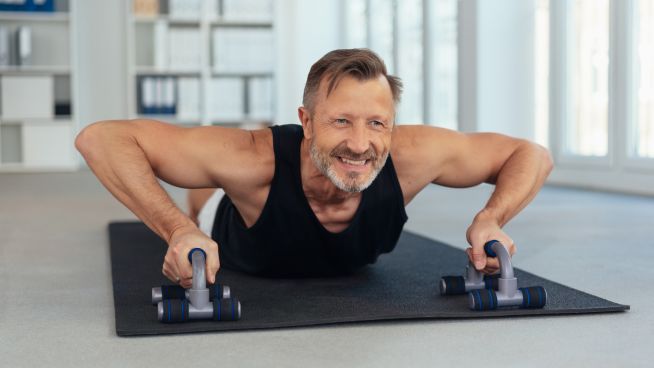STUDY: ‘One-Minute Workout’ Gets Beneficial Results
Well, it’s official: No one can claim they don’t have enough time to work out ever again.
Although multiple studies have shown you can reap big benefits from workout sessions as short as 30 or 20 minutes, new research takes the time threshold to an all-time low. A recent study conducted at McMaster University in Ontario suggests that as little as one minute of high intensity exercise—within a 10-minute workout that includes a warmup and cool down—can improve cardiovascular health.
The researchers at McMaster put 14 overweight and inactive, but healthy, men and women on a controlled nutrition plan and had them perform three workouts per week for six weeks. The workout consisted of a two-minute warm-up, three intervals of 20 seconds of intense exercise followed by a two minutes of recovery, and a two-minute cooldown.
The results? With just 30 minutes of exercise time per week, only three of which devoted to high intensity exercise, participants lowered their blood pressure and increased their VO2 max (maximal aerobic capacity, or oxygen uptake.)
RELATED: What is VO2 Max and Why Is It Important for Athletes?
“The improvement in fitness, in VO2 max and the muscles’ ability to use oxygen, was 12 percent in six weeks. . . a striking and dramatic change, especially given the very small amount of exercise,” said Dr. Martin Gibala, a professor of kinesiology at McMaster who supervised the study.
Gibala has been researching high intensity interval training (or HITT) for close to a decade, and most of his studies have confirmed the effectiveness of the method—physiologically, health- and performance-wise—compared to traditional steady-pace endurance exercise.
The goal of Gibala’s latest study was to reduce the time spent working out and investigate the impact of HITT on the body even in a very low-volume approach.
“It’s reasonable to say that this would be comparable to at least 30 to 40 minutes of traditional moderate intensity cardio,” said Gibala, “We’re talking about a 10-minute time commitment, 1 minute of intense exercise, three times a week.”
Read more:
RECOMMENDED FOR YOU
MOST POPULAR
STUDY: ‘One-Minute Workout’ Gets Beneficial Results
Well, it’s official: No one can claim they don’t have enough time to work out ever again.
Although multiple studies have shown you can reap big benefits from workout sessions as short as 30 or 20 minutes, new research takes the time threshold to an all-time low. A recent study conducted at McMaster University in Ontario suggests that as little as one minute of high intensity exercise—within a 10-minute workout that includes a warmup and cool down—can improve cardiovascular health.
The researchers at McMaster put 14 overweight and inactive, but healthy, men and women on a controlled nutrition plan and had them perform three workouts per week for six weeks. The workout consisted of a two-minute warm-up, three intervals of 20 seconds of intense exercise followed by a two minutes of recovery, and a two-minute cooldown.
The results? With just 30 minutes of exercise time per week, only three of which devoted to high intensity exercise, participants lowered their blood pressure and increased their VO2 max (maximal aerobic capacity, or oxygen uptake.)
RELATED: What is VO2 Max and Why Is It Important for Athletes?
“The improvement in fitness, in VO2 max and the muscles’ ability to use oxygen, was 12 percent in six weeks. . . a striking and dramatic change, especially given the very small amount of exercise,” said Dr. Martin Gibala, a professor of kinesiology at McMaster who supervised the study.
Gibala has been researching high intensity interval training (or HITT) for close to a decade, and most of his studies have confirmed the effectiveness of the method—physiologically, health- and performance-wise—compared to traditional steady-pace endurance exercise.
The goal of Gibala’s latest study was to reduce the time spent working out and investigate the impact of HITT on the body even in a very low-volume approach.
“It’s reasonable to say that this would be comparable to at least 30 to 40 minutes of traditional moderate intensity cardio,” said Gibala, “We’re talking about a 10-minute time commitment, 1 minute of intense exercise, three times a week.”
Read more:












